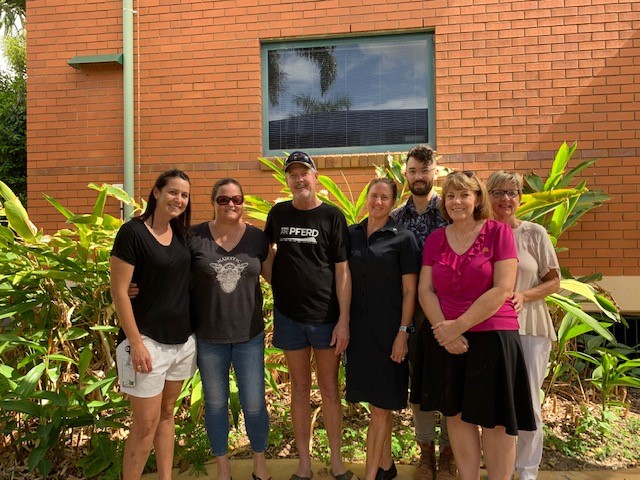Slim Altmann is lucky to be alive after surviving multiple cardiac arrests and heart attacks thanks to the skilled hospital staff at Proserpine Hospital.
The 52-year-old was shocked back into life 16 times in November last year and returned to Proserpine Hospital earlier this year to thank staff for saving his life.
Slim initially thought his chest pain was a bout of indigestion after dinner with his partner Julie.
“We arrived home and I said I was going to lay down for a bit, but I couldn’t get comfortable, so I sat up and talked for a bit and then thought we’d better go to hospital because I was a bit short of breath,” Slim said.
“Casey Porter (registered nurse) met me at the door and she knows my family history so immediately she sat me down for an ECG. Shaun Grimes (doctor) had one look and said ‘Slim you’ve had a heart attack’,” he said.
Dr Grimes said Slim’s survival was due to excellent teamwork from all staff.
“We as a team were doing CPR for hours between shocks as Slim was repeatedly arresting – even a midwife came over to resus to help us,” he said.
“The usual treatment when shocking a patient is to need it once, but Slim set a Proserpine record – one we hope nobody ever tries to break!”
Slim was given clot-busting medication to help restore blood flow and later had a stent inserted to keep his blocked artery open.
“They asked me what the pain in my chest was and I said six out of 10, then I had a drink of water and it was 10 out of 10 and then I died there on the table,” he said.
“At one point I opened my eyes and looked at the ceiling and the doctor said ‘you’re back Slim’ and I said, ‘I didn’t go anywhere’. What he said didn’t make any sense”.
Dr Declan McGavin said while staff were preparing to administer clot-busting medication Slim had another heart attack.
“We started CPR and gave him the medication and then used the defibrillator for the first of many times,” Dr McGavin said.
“Fortunately, he had a shockable rhythm and after every third or fourth shock we’d get a return of circulation and a palpable pulse.
“Slim’s heart would start beating on its own again but then 30 seconds to five minutes later it’d stop and he would arrest again so we’d start all over.
“This continued to happen while he was on the rescue helicopter and again when he was been wheeled from the Townsville helipad to the Cardiac Catheter Laboratory,” he said.
Dr McGavin said emergency staff were trained to focus on a ‘chain of survival’ – the necessary steps to have a good outcome – early recognition of a cardiac arrest, effective CPR, defibrillation and access to advanced life support.
“Slim was lucky he arrested in our resus bay and all four of those things were met early,” Dr McGavin said.
Dr McGavin said Slim was a very lucky man.
“After the third shock he looked up and said hello. He could tell us who he was and where he was, and then he arrested again soon after that,” he said.
Slim said his hear heart stopped again on the chopper to Townsville and again on the operating table in Townsville, later waking up in the Townsville University Hospital’s Intensive Care Unit.
“I’m still in a bit of denial. I don’t know why I’m alive, I haven’t worked that out. I’m glad I don’t remember most of it and I’m thankful for that,” he said.
“I’m going to have a birthday party this year I think – one I shouldn’t have had.”
Slim said the Proserpine and Townsville teams did an amazing job.
“One time it took 20 minutes to get my heart going again and the Proserpine team never gave up, even though the chances of survival were minimal. Their dedication and professionalism were unbelievable,” he said.
Slim has since been told his heart is now working well with minimal scarring. He is already back working full time with his land prep business.
Slim said his father’s death from a heart attack at 53 had always been on his mind.
“He lived 16km from town and couldn’t get to hospital. I always wondered if I would live to be older than my old man, and it almost didn’t happen.”
Slim said he had no symptoms before his heart attack. “If you ask me there was nothing wrong with me, I could work all day on the tractors no problem,” he said.
Common heart attack signs and symptoms include:
• Pressure, tightness, pain, or a squeezing or aching sensation in your chest or arms that may spread to your neck, jaw or back
• Nausea, indigestion, heartburn or abdominal pain
• Shortness of breath
• Cold sweat
• Fatigue
• Light-headedness or sudden dizziness.



